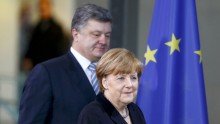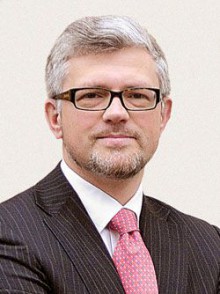Another round of talks between Petro Poroshenko, President of Ukraine, and Angela Merkel, Chancellor of Germany, was finished February 1. Before the talks, many commentators suggested that the Ukrainian president would be explicitly told not to delay the constitutional amendments and the elections in the occupied territories of eastern Ukraine. The Day asked Andrii Melnyk, Ambassador of Ukraine in Germany, who was directly involved in the negotiations, to comment on their outcome.
“The negotiations lasted a relatively short time, a bit more than an hour and a half, but they were extremely intense. And, most importantly, they were extremely sincere and directed for the result. It should be noted that it is the fifth visit of the Ukrainian head of the state to Germany. In addition to that, there were numerous meetings of Poroshenko and Merkel at international venues, as well as 34 telephone conversations between the two leaders. During this time, they have managed to establish a very trusting and personal contact at the highest level. And it was the same friendly atmosphere in which the last negotiations were held. The main purpose of the meeting was to agree upon reciprocal steps on both sides, through which we could move towards the implementation of Minsk II. Personally, Chancellor Merkel has no illusions about the fragility of the truce in the east. Thus, the principal thesis of the Head of the Federal Government was that the full permanent ceasefire and the improvement in general security of the region are required before anyone could speak about proper implementation of the remaining commitments outlined in the Minsk agreements, which include the elections in the occupied territories. Therefore it was agreed that Germany will continue to put pressure on the Russian leadership in order to provide this fundamental premise. By the way, the demand to stop separatist attacks and provide access for the OSCE observation mission was the main message, explicitly conveyed today [February 2. – Ed.] by Chancellor Merkel in a telephone conversation with Russian President Vladimir Putin.
“But of course, the talks in Berlin on February 1 had in its center the implementation of Minsk commitments on behalf of Ukraine, including the constitutional reform. The Chancellor assured of her understanding of the objective difficulties that occur in this process, especially the ones that arise among the members of Verkhovna Rada. At the same time, Merkel emphasized the importance of finding a compromise, because the Russians should not be given even the slightest reason to accuse Kyiv of alleged unwillingness in regard of implementing the Minsk agreement.
“Chancellor Merkel is well aware that any election in the occupied territories of eastern Ukraine is unrealistic in today’s conditions. It is obvious. Thus, the Berlin talks were centered on the urgent measures that should be taken to address the security issue, in order to ensure a comprehensive long-term truce and provide a foundation for the work of OSCE mission in the occupied territories, including the access to still uncontrolled sites on the Ukrainian-Russian border. And here we have a very clear willingness of the German leader to increase pressure on the Kremlin. On the other hand, a concrete agreement was reached on the coordination within the next 4-6 weeks regarding the draft law on elections. According to the Chancellor, the progress in this issue will be essential for the continuation of the EU sanctions against Russia this summer – because time, unfortunately, plays against Ukraine.
“It would be naive to expect any guarantees, because the appropriate decision will be made by consensus of the 28 member states. As recognized by the Chancellor, the situation within the EU is a very uneasy concerning the prospects of prolonging sanctions. Similarly, in Germany itself there are increasingly louder calls for the Federal Government to abolish them. But despite all these circumstances, we have unequivocal personal assurances of Merkel to do everything possible in order to ensure unity among European countries on the mode of sanctions until all the obligations of Minsk II are fulfilled without any exception.”









